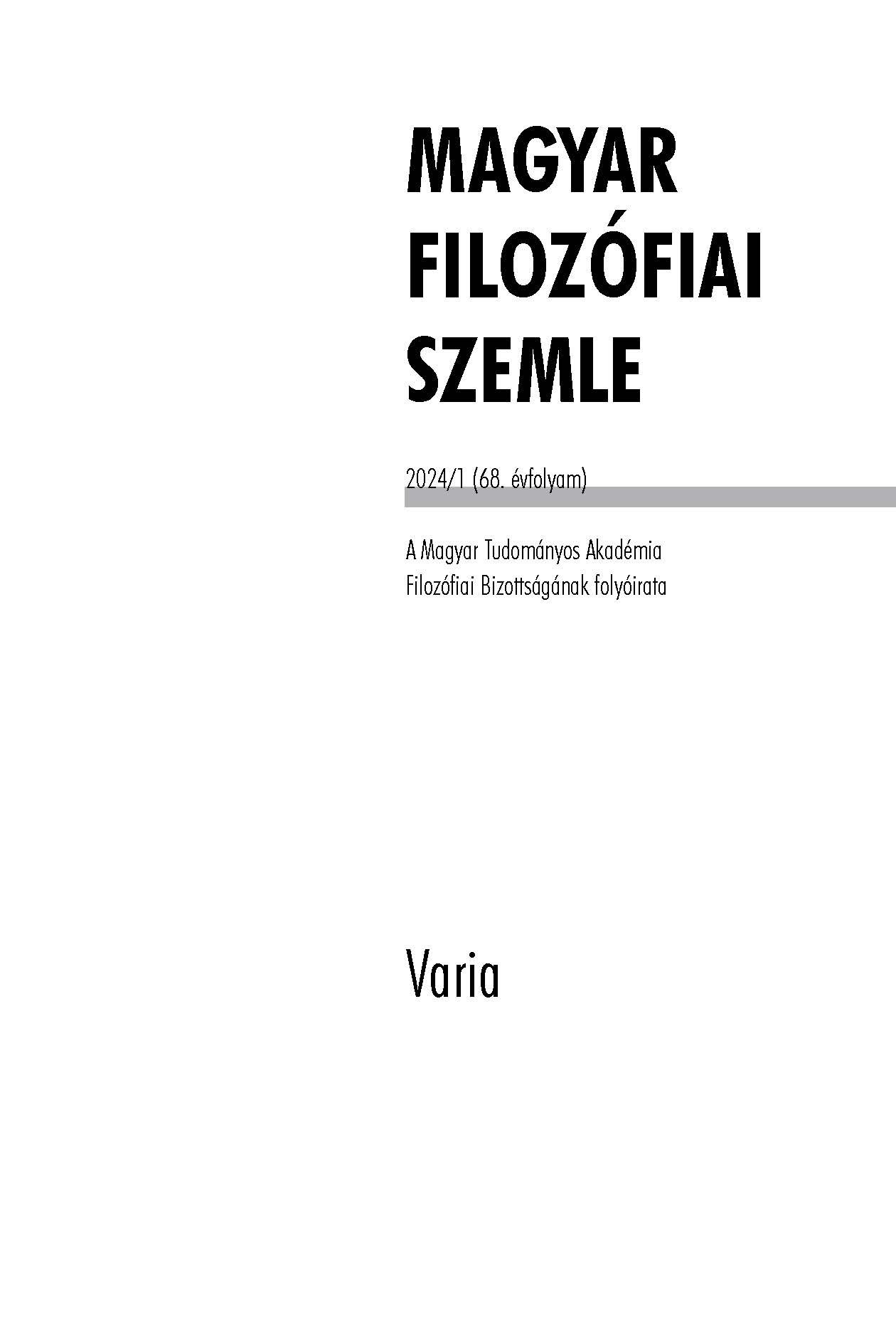Elemér Hankiss’s Theory of Culture
Abstract
In his many-faceted oeuvre, Elemér Hankiss paid special attention to the questions of culture and civilization. This paper examines the theory of culture and civilization in the late writings of Elemér Hankiss. After conceptual clarifications, it will be shown that his basic assumption is that human existence cannot cope with its intellectual and emotional dangers. His functionalist approach to culture and civilization will be followed as well as his reading of the ancient experiences which are answered by culture. As a first step, Hankiss’s conception of the human strangeness in the world is reconstructed. Afterwards, the idea that culture and civilization could be a kind of solution to this being alien in the world is critically examined. As critical summary, it might be stressed that, in contrast to Hankiss’s argumentation, the consume of cultural products cannot be reduced to satisfaction of psychological, metaphysical needs. In this sense culture basically differs from biological, physiological needs. In addition, the functionalist approach suffers from a principal shortcoming that results from the concept of cultural products as symbolic protective shields. In this approach we cannot distinguish between different levels of cultural products, and so their essential differences cannot be taken into account either.
References
Assmann, Aleida 2006. Einführung in die Kulturwissenschaft. Grundbegriffe, Themen, Fragestellungen. Berlin, Erich Schmidt Verlag.
Freud, Sigmund 1982. Rossz közérzet a kultúrában. Ford. Linczényi Adorján. In Uő: Esszék. Budapest, Gondolat. 327-405.
Csíkszentmihályi Mihály 1991. FLOW. Az áramlat. A tökéletes élmény pszichológiája. Ford. Legéndyné Szabó Edit Budapest, Akadémiai Kiadó.
Danto, Arthur C. 1992. Beyond the Brillo-Box. Berkeley - Los Angeles. University of California Press.
Dosse, François 1996. Geschichte des Strukturalismus. I. köt. Hamburg, Junius.
Fiedler, Leslie 1999. A New Fiedler Reader. New York, Prometheus Books.
Fuhrmann, Manfred 2002. Bildung. Europas kulturelle Identität. Stuttgart, Reclam.
Han, Byung-Chul 2021. A szép megmentése. Budapest, Typotex.
Hankiss Elemér 1971. Strukturalizmus 1-2. Budapest, Európa.
Hankiss Elemér 1979. Társadalmi csapdák. Budapest, Magvető.
Hankiss Elemér 1985. Az irodalmi mű mint komplex modell. Budapest, Magvető.
Hankiss 1997a. Az emberi kaland. Egy civilizáció-elmélet vázlata. Budapest, Helikon.
Hankiss Elemér 1997b. A félelem és a társadalomtudományok. Mozgó Világ. 23/7. 63-80.
Hankiss Elemér 1999. Proletár reneszánsz. Tanulmányok az európai civilizációról és a magyar társadalomról. Budapest, Helikon.
Hankiss Elemér 2008. Ikarosz bukása. Lét és Sors az európai civilizációban. Budapest, Osiris.
Hankiss Elemér 2012. A Nincsből a Van felé. Gondolatok az élet értelméről. Budapest, Osiris.
Hankiss Elemér 2014. A befejezetlen ember. Budapest, Osiris.
Hankiss Elemér 2015. Az ezarcú én. Emberlét a fogyasztói társadalomban. Budapest, Helikon.
Hansen, Klaus P. 2011. Kultur und Kulturwissenschaft. Tübingen-Basel, A. Francke.
Herder, Johann Gottlieb 1983. Értekezések - levelek. Ford. Rajnai László. Budapest, Európa.
Huyssen, Andreas 1986. After the Great Divide. Modernism, Mass Culture, Postmodernism. Bloomington/IN, Indiana University Press. https://doi.org/10.1007/978-1-349-18995-3
Jäger, Werner 1946. Paideia. The Ideals of Greek Culture. I. köt. Oxford, Basil Blackwell.
Kapitány Ágnes - Kapitány Gábor 2018. Az ezerarcú én - az ezerarcú szimbólum. In: Takács M. József (szerk.): Hankiss Elemér-Emlékkönyv. Budapest, Helikon.
Lyotard, Jean-François 1993. A posztmodern állapot. Ford. Angyalosi Gergely. In Jürgen Habermas - Jean-François Lyotard - Richard Rorty: A posztmodern állapot. Budapest, Osiris. 7-145.
Lüddeman, Stefan 2010. Kultur. Eine Einführung. Wiesbaden, Verlag für Sozialwissenschaften.
Malpas, Simon 2005. The Postmodern. London - New York, Routledge. https://doi.org/10.4324/9780203307120
Malpas, Simon 2010. Postmodern. In Rosi Braidotti (szerk.): The History of Continental Philosophy. Volume 7. After Poststructuralism: Transitions and transformations. Chicago, University of Chicago Press. 11-31.
Moebius, Stephan - Quadflieg, Dirk 2011. Kulturtheorien der Gegenwart - Heterotopien der Theorie. In Uők (szerk.): Kultur. Theorien der Gegenwart. Wiesbaden, VS Verlag. 11-19. https://doi.org/10.1007/978-3-531-92056-6_1
Olay Csaba 2020. Művészet és tömegkultúra. Frankfurti iskola, Hannah Arendt és a következmények. Budapest, MTA Doktori értekezés.
Pradel, Jean-Louis 2002. A jelenkor művészete. Ford. Tészabó Júlia. Budapest, Helikon.
Reese-Schäfer, Walter 1995. Lyotard. Hamburg, Junius.
Schulze, Gerhard 1993. Die Erlebnisgesellschaft. Kultursoziologie der Gegenwart. Frankfurt - New York, Campus.
Skelly, James Malachy 2018. Hankiss "fogkréme" ma - a jelenkori háború és az én egzisztenciális válsága. Ford. Szalai Éva. Magyar Tudomány. 179/10. 1515-1523.
Sümegi István 2015. "Saját kényemre, szabadon" - Hankiss Elemér filozófiai munkáiról. BUKSZ - Budapesti Könyvszemle. 27/3-4. 131-140. (http://buksz.c3.hu/150304/02.1birsumegihankiss.pdf - utolsó letöltés: 2024. 05. 07.)
Taylor, Charles 1989. Sources of the Self. The Making of the Modern Identity. Cambridge/MA, Harvard University Press.
Volkmann, Ute 2007. Das Projekt des schönen Lebens - Gerhard Schulzes "Erlebnisgesellschaft". In Uwe Schimank - Ute Volkmann (szerk.): Soziologische Gegenwartsdiagnosen I. Wiesbaden, Verlag für Sozialwissenschaften. 75-89. https://doi.org/10.1007/978-3-531-90736-9_5
Welsch, Wolfgang 2008. Unsere postmoderne Moderne. 7. kiad. Berlin, Akademie Verlag. https://doi.org/10.1524/9783050061627



